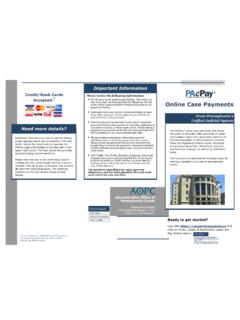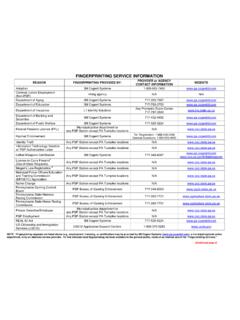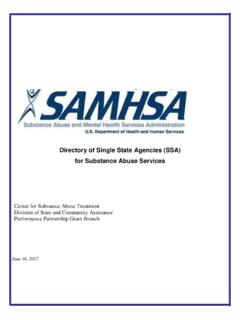Transcription of The Administrative Office of Pennsylvania Courts F I S C A ...
1 The Magisterial District Judge System (MDJS) and Common Pleas Case Management System (CPCMS) are the computer systems used by the Magisterial District and Common Pleas Courts . The systems were created at the discretion of the Supreme Court of Pennsylvania by the Administrative Office of Pennsylvania Courts (AOPC) to record and track the business of the Courts . More than systems for recording docket numbers, these are case management systems that provide judges, court staff, probation, accounting and other departments with case administration, reporting, and accounting functions. With regards to collections in particular, MDJS and CPCMS provide functions to record assessments, receipt payments, create payment plans, manage delinquent accounts and follow up with enforcement measures.
2 The systems also interact with other state and federal criminal justice systems, providing information to a wide range of agencies and officials. Payment Reports: Payment reports are used to monitor information about active payment plans, payments made against them, and find assessments that are not on payment plans. Enforcement Reports: Enforcement reports can identify payment plans that are overdue and are used by the Courts to take proactive measures. Collection Agency Reports: Collection Agency reports are used to monitor payment plans referred to collections and view payments made on referred payment plans. A G U I D E T O C O L L E C T I O N S I N T H E P E N N S Y LV A N I A C O U R T S One of the primary Administrative functions of the Pennsylvania Courts is to ensure that defendants and other responsible individuals carry through on the obligations to pay costs, fines, and restitution on their cases.
3 This guide will introduce you to the different methods of collection available to the Pennsylvania Courts that are managed through the Magisterial District Judge System (MDJS) and Common Pleas Case Management System (CPCMS) computer applications. As the Administrative arm of the Pennsylvania Supreme Court, the Administrative Office of Pennsylvania Courts (AOPC) carries out the court s policy and management directives while also providing policy guidance, Administrative support, technical assistance, and legal representation for jurists and court administrators within the 60 judicial districts. The AOPC is led by the Court Administrator of Pennsylvania . The AOPC also manages the network of information exchanged with other state and federal agencies such as the department of public welfare , Pennsylvania State Police, the Pennsylvania Justice Network, Pennsylvania Commission on Sentencing, and the Juvenile Court Judges Commission.
4 For more information on the AOPC and the departments that support the Courts , visit the Pennsylvania Judiciary s website at: The case management systems provide court staff with the ability to monitor payments made on cases and manage delinquent accounts through the use of a wide range of reports. Three different types of reports are available: F I S C A L R E P O R T S W H A T A R E M D J S A N D C P C M S ? The Administrative Office of Pennsylvania Courts public Access The Supreme Court of Pennsylvania has estab-lished standards and protocols for public access to court records. For information on these poli-cies, click the public Access button at the bottom of the Pennsylvania Judiciary s website ( ). C O L L E C T I O N S I N T H E PE N N S Y L V A N I A C O U R T S Fines, costs, and restitution are frequently ordered by a judge when an individual has entered a guilty plea or has been found guilty of an offense.
5 These orders are then passed on to court staff who are responsible for recording the court s ruling and any accompanying monetary assessments. The case management systems used by the Courts for recording this information, MDJS and CPCMS, provide numerous fiscal functions that manage and track all court-levied assessments and generate the corresponding receipts. The flexibility of these systems provide the Courts multiple ways to accept payment and, conversely, to facilitate payment if an individual fails to remit. When an individual makes a payment on a case balance, cash, checks, and money orders are some of the more common methods of remittance. For each of these methods, the remitter can mail their payment to the court or make payment in person at the court Office . In these instances, the court can record their payment in the case management system and produce a receipt for the remitter.
6 Any payment recorded on a case will automatically be applied to the assessments on the case according to the Uniform Disbursement Schedule (UDS). However, if these payment methods or the overall payment amount is prohibitive to the remitter, alternative methods are available. What is the UDS? The UDS was instituted by the Pennsylvania Supreme Court to direct the disbursement of all fines, fees, costs, penalties and restitution. The established disbursement schedule is in compliance with legislation that gives priority to the payment of victims and collection agency fees. The UDS ensures that payments are disbursed appropriately on all cases. The Courts offer, or may require, additional payment options that can be utilized to make the remittance process more practical for individuals with a case balance.
7 Payment Plans Depending on the sum of fines, costs, and restitution levied on a case, an individual may not be able to remit the payment amount in a single lump sum. To assist these individuals with the challenge of repaying these assessments, a remitter can work with court staff or the judge to determine a periodic payment schedule that fits within their financial means. This agreement, referred to as a payment plan, is then recorded by the court in the case management system to provide a systematic way to track payment amounts and due dates. For individuals who owe money on multiple cases, payment plans can also be used to consolidate those separate assessments so payments can be remitted for all outstanding debts simultaneously. All payments recorded on a payment plan are automatically applied by the case management systems according to the UDS.
8 PAePay PAePay is a service provided on the UJS Portal that can be used to make payments on a case or payment plan, via the internet, with a credit or debit card. PAePay is highly convenient to defendants because it is a 24-hour a day service that eliminates the need to pay by mail or at a court Office . PAePay is used by all Magisterial District and Common Pleas Courts across the state and is systematically integrated with MDJS and CPCMS so these electronic payments can be applied to the appropriate cases or payment plans. Court staff can use MDJS or CPCMS to track the payment schedules for all remitters in order to monitor for payment delinquency. These systems also provide tools that are used to notify the remitters that they need to bring their accounts up to date. Overdue Payment Notices At the Magisterial District Courts , MDJS will automatically generate lists that prompt the court to take action when payments are late.
9 These lists are used to generate overdue payment notices for the responsible remitters to inform them that a warrant may be issued, their license may be suspended, or, for juveniles, their case will be transferred to Common Pleas for further action, if payment is not made within a specified time period. In CPCMS, Common Pleas court staff can utilize any of three overdue payment notices that can be sent periodically when the responsible individual fails to remit. These letters indicate that payments are past due and requests that they be brought up to date or paid in full. As matters escalate, a collections letter is available to inform individuals that they are being referred to a collection agency. The value of overdue payment notices is that they give the remitter the opportunity to resume timely payments or, alternatively, attend a hearing in order to avoid additional enforcement actions.
10 Hearings Hearings may be held before a judge when other measures have failed to procure payment from the responsible remitter. At a hearing, this individual works with the judge to establish a payment plan, if one was not previously created, or make any modifications to an existing plan to make it possible for the individual to make timely payments. Failure to appear for a hearing can result in a warrant being issued for the remitter or referral to a collection agency. In the Court of Common Pleas, hearings for payment delinquency may also be held before a probation officer, as a preemptive enforcement measure, since nonpayment is a violation of the conditions of probation. MDJS and CPCMS help facilitate hearings by allowing court staff to schedule the hearings on the court calendar, produce hearing notices, and record the outcome of the hearing.




